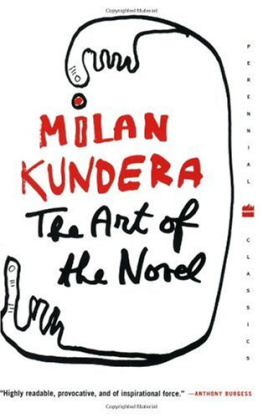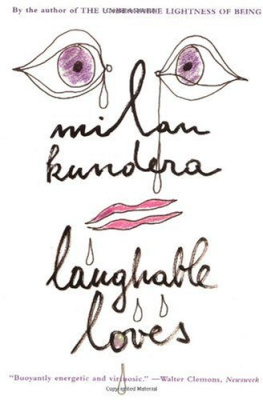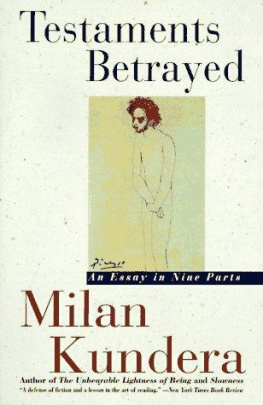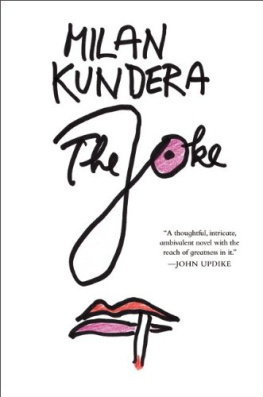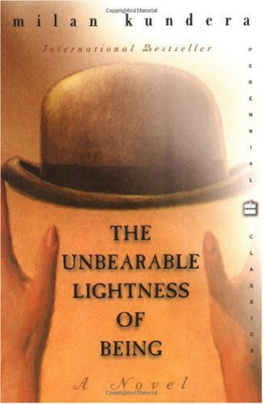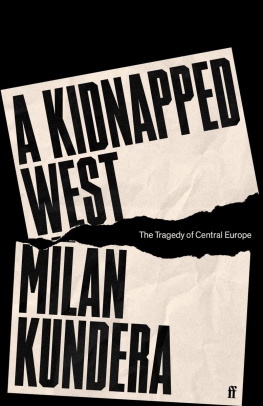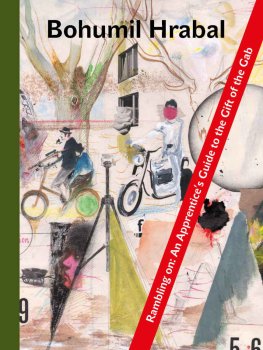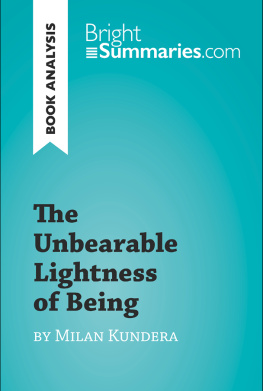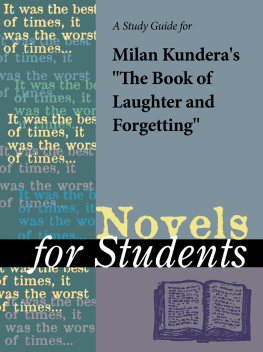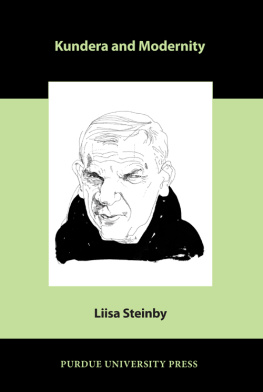
MILAN KUNDERA
The Art of the Novel
Translated from the French by Linda Asher
Copyright 1986 by Milan Kundera
English translation copyright 1988 by Grove Press, Inc.
First published in French as L'Art du roman by
Editions Gallimard, 1986
ISBN 0-8021-0011-2
Parts One and Five first appeared in English in translations by David Bellas, respectively as "The Novel and Europe" (The New York Review of Books, July 19, 1984) and "Somewhere Beyond" (Granta 11, 1984). With the permission of Mr. Bellos, these translations have been extensively revised by the translator of this book in light of the author's revisions of his original texts and in order to achieve a consistent style. Part Two appeared in Salmagundi 73 (Winter 1987) under the title "Conversation with Milan Kundera on the Art of the Novel." Part Pour: Portions of this much revised and enlarged interview appeared (in another translation) in The Paris Review 92 (1984) as "The Art of Fiction LXXX1: Milan Kundera." Some of the "Sixty-three Words" of Part Six were first published in English early in 1988 in The New York Times Book Review, and Part Seven appeared in The New York Review of Books (June 13,, 1985) as "Man Thinks, God Laughs."
Though most of the pieces in this book owe their existence to various specific circumstances, I conceived them all with the idea that they would someday be linked together in one book-essay setting out my thoughts on the art of the novel.
(Need I stress that I intend no theoretical statement at all, and that the entire book is simply a practitioner's confession? Every novelist's work contains an implicit vision of the history of the novel, an idea of what the novel is; I have tried to express here the idea of the novel that is inherent in my own novels.)
"The Depreciated Legacy of Cervantes," written in 1983, describes my personal conception of the European novel and begins this "seven-part essay."
The same year, The Paris Review asked Christian Salmon to interview me about my practical experiences with the art of the novel. I divided that text (which is not a transcript of an actual conversation but an edited dialogue) into two separate pieces, of which the first, "Dialogue on the Art of the Novel," became Part Two of this volume.
When Gallimard published a new edition of The Sleepwalkers, I was eager to reacquaint the French public with Broch, and I published an essay called "The Testament of The Sleepwalkers" in Le Nouvel Observateur. After Guy Scarpetta brought out his excellent
"Introduction to Hermann Broch," I decided not to include my essay here. Still, because The Sleepwalkers is so prominent in my own personal history of the novel, I could not entirely avoid writing about it, so Part Three consists of "Notes Inspired by The Sleepwalkers," a series of reflections that does not so much analyze that work as acknowledge how much I we all owe to it.
"Dialogue on the Art of Composition" uses my own novels to discuss several artistic,
"craft" problems of the novel, especially of its architecture.
"Somewhere Behind" (1979) is a summary of my reflections on Kafka's novels.
"Sixty-three Words" (1986) is a "dictionary" of certain key words that appear throughout my novels, and key words in my aesthetic of the novel.
In the spring of 1985, I received the Jerusalem Prize. Father Marcel Dubois, a Dominican and professor at the Hebrew University, read the eulogy in English with a heavy French accent; with a heavy Czech accent, in French, I read my own speech of thanks, knowing that it would constitute the last part of this book, the closing lines of my reflection on the novel and Europe. I could have done it in no setting more thoroughly European, more cordial or dear to me.
PART ONE
The Depreciated Legacy of Cervantes - 3
PART TWO
Dialogue on the Art of the Novel - 23
PART THREE
Notes Inspired by "The Sleepwalkers" - 47
PART FOUR
Dialogue on the Art of Composition - 71
PART FIVE
Somewhere Behind - 99
PART SIX
Sixty-three Words - 121
PART SEVEN
Jerusalem Address: The Novel and Europe - 157
PART ONE
The Depreciated Legacy of Cervantes
In 1935, three years before his death, Edmund Husserl gave his celebrated lectures in Vienna and Prague on the crisis of European humanity. For Husserl, the adjective
"European" meant the spiritual identity that extends beyond geographical Europe (to America, for instance) and that was born with ancient Greek philosophy. In his view, this philosophy, for the first time in History, apprehended the world (the world as a whole) as a question to be answered. It interrogated the world not in order to satisfy this or that practical need but because "the passion to know had seized mankind."
The crisis Husserl spoke of seemed to him so profound that he wondered whether Europe was still able to survive it. The roots of the crisis lay for him at the beginning of the Modern Era, in Galileo and Descartes, in the one-sided nature of the European sciences, which reduced the world to a mere object of technical and mathematical investigation and put the concrete world of life, die Lebenswelt as he called it, beyond their horizon.
The rise of the sciences propelled man into the tunnels of the specialized disciplines. The more he advanced in knowledge, the less clearly could he see either the world as a whole or his own self, and he plunged further into what Husserl's pupil Heidegger called, in a beautiful and almost magical phrase, "the forgetting of being."
Once elevated by Descartes to "master and proprietor of nature," man has now become a mere thing to the forces (of technology, of politics, of history) that bypass him, surpass him, possess him. To those forces, man's concrete being, his "world of life" (die Lebenswelt), has neither value nor interest: it is eclipsed, forgotten from the start.
Yet I think it would be naive to take the severity of this view of the Modern Era as a mere condemnation. I would say rather that the two great philosophers laid bare the ambiguit y of this epoch, which is decline and progress at the same time and which, like all that is human, carries the seed of its end in its beginning. To my mind, this ambiguity does not diminish the last four centuries of European culture, to which I feel all the more attached as I am not a philosopher but a novelist. Indeed, for me, the founder of the Modern Era is not only Descartes but also Cervantes.
Perhaps it is Cervantes whom the two phenome-nologists neglected to take into consideration in their judgment of the Modern Era. By that I mean: If it is true that philosophy and science have forgotten about man's being, it emerges all the more plainly that with Cervantes a great European art took shape that is nothing other than the investigation of this forgotten being.
Indeed, all the great existential themes Heidegger analyzes in Being and Time considering them to have been neglected by all earlier European philosophy had been unveiled, displayed, illuminated by four centuries of the novel (four centuries of European reincarnation of the novel). In its own way, through its own logic, the novel discovered the various dimensions of existence one by one: with Cervantes and his contemporaries, it inquires into the nature of adventure; with Richardson, it begins to examine "what happens inside," to unmask the secret life of the feelings; with Balzac, it discovers man's rootedness in history; with Flaubert, it explores the terra previously incognita of the everyday; with Tolstoy, it focuses on the intrusion of the irrational in human behavior and decisions. It probes time: the elusive past with Proust, the elusive present with Joyce. With Thomas Mann, it examines the role of the myths from the remote past that control our present actions. Et cetera, et cetera.
Next page
